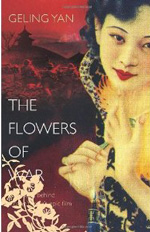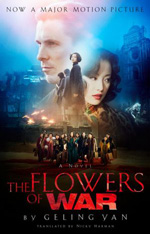

Harvill Secker (UK), hardcover, 9781846555893

Other Press, paperback, 9781590515563
Before reading Geling Yan's The Flowers of War, I had never heard of the Nanking Massacre. I was surprised to learn about this fairly recent historical event (1937-38), and even more surprised that it was never covered in my high school or university education. Yan's novel provides in intimate look at that horrible six weeks in Chinese history, focusing not on the event as a whole, but on the plight of the inhabitants of one church in Nanking. Her detached yet emotional tone drew me into the world of the church, and fueled my curiosity to learn about this unknown massacre.
In an American church run by Father Engelmann live three groups of very different people. First, there is the Father himself, and other church officials and workers. These people are all men, and all are alone in the world. Some are strangers to China; others were brought up without parents; all give everything they have for the church. Next, there is a group of Chinese schoolgirls, hiding in the church from the invading Japanese, unable to escape to their families. Finally, over the walls of the church comes a group of prostitutes who refuse to leave. They take up residence in the church cellar, and bring with them touches of their immoral world.
The innocent schoolgirls and the prostitutes, two groups of women as dissimilar as possible, instantly hate each other. Competing for food, water, and the attention of the church officials, the women engage in physical fights and insults. Each wants the other to leave—to be cast out into the violent city of Nanking.
Yan is careful to avoid stereotypes, having the prostitutes and the schoolgirls commit equally good and bad deeds. She explores the backgrounds of the many characters, shining light on the lives behind the brothel or church. The men are equally dynamic, each with his own story to tell. In a cast of characters this large, it is easy to resort to clichés and archetypes. Yan avoids this, making her characters vivid and complex, and giving each his or her turn to speak.
Told from a third-person perspective, The Flowers of War has a detached tone, as
though there is a great distance between the reader and the characters. Scenes of war
are told in blunt detail, with the focus on the actions of people rather than their emotions.
However, Yan's book is oddly moving, with a chilling ending that celebrates the triumph of
human goodness.
